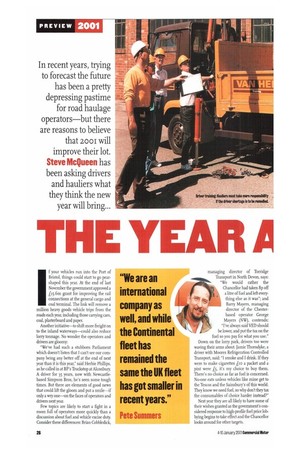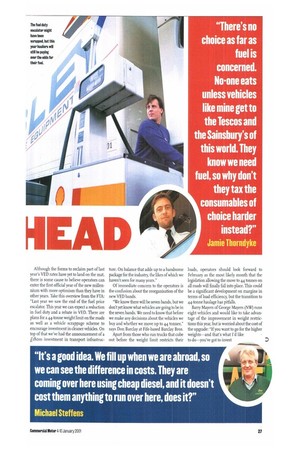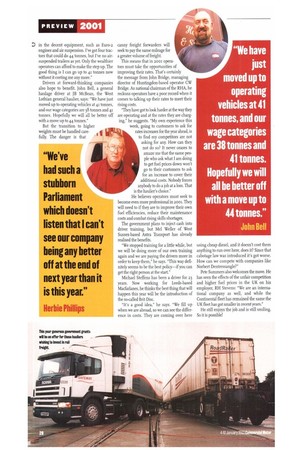1 f your vehicles run into the Port of Bristol,
Page 28

Page 29

Page 30

If you've noticed an error in this article please click here to report it so we can fix it.
things could start to go pearshaped this year. At the end of last November the government approved a 05.6m grant for improving the rail connections at the general cargo and coal terminal. The link will remove a 1 f your vehicles run into the Port of Bristol, things could start to go pearshaped this year. At the end of last November the government approved a 05.6m grant for improving the rail connections at the general cargo and coal terminal. The link will remove a
million heavy goods vehicle trips from the roads each year, including those carrying cars, coal, plasterboard and paper.
Another initiative—to shift more freight on to the inland waterways—could also reduce lorry tonnage. No wonder the operators and drivers are gloomy:
"We've had such a stubborn Parliament which doesn't listen that I can't see our company being any better off at the end of next year than it is this year," said Herbie Phillips, as he called in at BP's Truckstop at Alconbury. A driver for 35 years, now with Newcastlebased Simpson Bros, he's seen some tough times. But there are elements of good news that could lift the gloom and put a smile—if only a wry one—on the faces of operators and drivers next year.
Few topics are likely to start a fight in a room full of operators more quickly than a discussion about fuel and vehicle excise duty. Consider these differences: Brian Cobbledick,
managing director of Torridge Transport in North Devon, says: "We would rather the Chancellor had taken 8p off a litre of fuel and left everything else as it was"; and AM Barry Mayers, managing director of the Chesterbased operator George Mayers (NW), contends: "I've always said VED should be lower, and put the tax on the fuel so you pay for what you use." Down on the lorry park, drivers too were waving their arms about. Jamie Thorndyke, a driver with Moores Refrigeration Controlled Transport, said: "I smoke and I drink. If they were to make cigarettes 00 a packet and a pint were f5, it's my choice to buy them. There's no choice as far as fuel is concerned. No-one eats unless vehicles like mine get to the Tescos and the Sainsbury's of this world. They know we need fuel, so why don't they tax the consumables of choice harder instead?" Next year they are all likely to have some of their wishes granted as the government's considered response to high-profile fuel price lobbying begins to take effect and the Chancellor looks around for other targets. Although the forms to reclaim part of last year's VED rates have yet to land on the mat, there is some cause to believe operators can enter the first official year of the new millennium with more optimism than they have in other years. Take this overview from the FTA: "Last year we saw the end of the fuel price escalator. This year we can expect a reduction in fuel duty and a rebate in VED. There are plans for a 44-tonne weight limit on the roads as well as a vehicle scrappage scheme to encourage investment in deaner vehides. On top of that we've had the announcement of a LiSom investment in transport infrastruc
ture. On balance that adds up to a handsome package for the industry, the likes of which we haven't seen for many years."
Of immediate concern to the operators is the confusion about the reorganisation of the new VED bands.
We know there will be seven bands, but we don't yet know what vehicles are going to be in the seven bands. We need to know that before we make any decisions about the vehicles we buy and whether we move up to 44 tonnes," says Don Barclay at Fife-based Barday Bros.
Apart from those who run trucks that cube out before the weight limit restricts their loads, operators should look forward to February as the most likely month that the legislation allowing the move to 44 tonnes on all roads will finally fall into place. This could be a significant development on margins in terms of load efficiency, but the transition to 44-tonne haulage has pitfalls.
Barry Mayers of George Mayers (NW) runs eight vehicles and would like to take advantage of the improvement in weight restrictions this year, but is worried about the cost of the upgrade: "If you want to go for the higher weights—and that's what I'd like to do—you've got to invest
0 in the decent equipment, such as Euro-2 engines and air suspension. I've got four tractors that could do 44 tonnes, but I've no airsuspended trailers as yet. Only the wealthier operators can afford to make the step up. The good thing is I can go up to 41 tonnes now without it costing me any more."
Drivers at forward-thinking companies also hope to benefit. John Bell, a general haulage driver at EB McBean, the West Lothian general haulier, says: "We have just moved up to operating vehicles at 41 tonnes, and our wage categories are 38 tonnes and 41 tonnes. Hopefully we will all be better off with a move up to 44 tonnes."
But the transition to higher
weights must be handled care1 11 fully The danger is that
canny freight forwarders will seek to pay the same mileage for a greater volume of freight.
This means that in 2001 operators must take the opportunities of improving their rates. That's certainly
the message from John Bridge, managing director of Huntingdon-based operator CW Bridge. As national chairman of the RHA, he reckons operators have a poor record when it comes to talking up their rates to meet their rising costs.
"They have got to look harder at the way they are operating and at the rates they are charging," he suggests. "My own experience this week, going to customers to ask for rates increases for the year ahead, is to find my competitors are not asking for any. How can they not do so? It never ceases to amaze me that the same people who ask what I am doing to get filet prices down won't go to their customers to ask for an increase to cover their additional costs. Nobody forces anybody to do a job at a loss. That is the haulier's choice."
He believes operators must seek to become even more professional in 2001. They will need to if they are to improve their own fuel efficiencies, reduce their maintenance costs and combat rising skills shortages.
The government plans to inject cash into driver training, but Mel Weller of West Sussex-based Axtra Transport has already realised the benefits.
"We stopped training for a little while, but we will be doing more of our own training again and we are paying the drivers more in order to keep them," he says. "This way definitely seems to be the best policy—if you can get the right person at the start.'
Michael Steffens has been a driver for 23 years. Now working for Leeds-based Macfarlanes, he thinks the best thing that will happen this year will be the introduction of the so-called Brit Disc.
"It's a good idea," he says. "We fill up when we are abroad, so we can see the difference in costs. They are coming over here using cheap diesel, and it doesn't cost them anything to run over here, does it? Since that cabotage law was introduced it's got worse. How can we compete with companies like Norbert Dentressangle?"
Pete Summers also welcomes the move. He has seen the effects of the unfair competition and higher fuel prices in the UK on his employer, RH Stevens: "We are an international company as well, and while the Continental fleet has remained the same the UK fleet has got smaller in recent years."
He still enjoys the job and is still smiling. So it is possible!




























































































